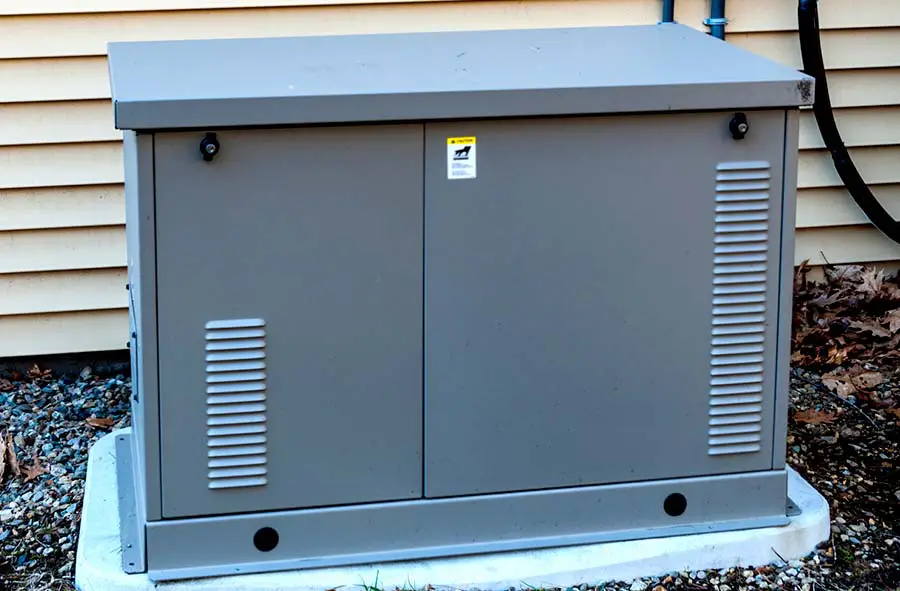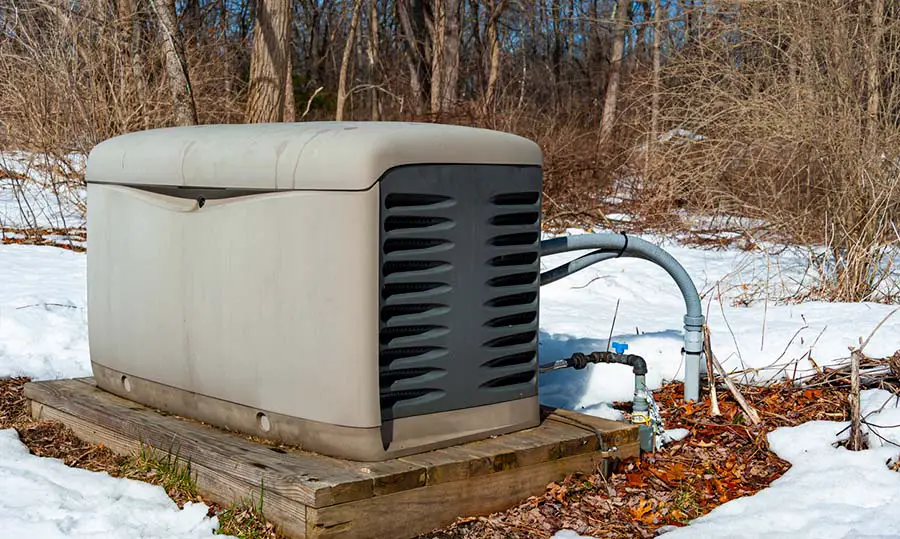
How long a whole house generator runs depends on several factors, including the make, the fuel type, the engine’s speed, and how you maintain it. A whole house generator is also called a standby generator, which indicates that you should only use it when you have no power from the grid.
A generator can only continuously run until it needs an oil change. The frequency of oil changes is between 50 and 100 hours, depending on the generator type. Natural gas generators can run for three weeks, while propane and diesel generators can run between 24 to 72 hours, depending on the size of the tank.
The question of how long a whole house generator runs has no simple answer because many different factors are involved. The size and type of the generator, the kind of fuel it uses, how often it needs an oil change, how often it needs service, and how well it has been maintained all affect its running time.
How Long Can You Run a Whole House Generator Continuously?
People say that a generator can run indefinitely as long as it has fuel, but this is not a useful answer. Fuel costs money, and for most of us, money is a limited resource. In any event, whole house generators are typically used to provide temporary backup power to a home.
Three main factors limit how long you can run a whole house generator:
- Fuel
- Oil
- Heat
In the following few sections, let’s take a more in-depth look at each of these factors and discuss what you can do to ensure your generator runs as long as possible while also staying in good working condition.
Fuel Is a Limiting Factor
Increasing the load on the generator also makes it burn more fuel, so if you are only using it to power a few appliances, you would be able to run it for longer than if you are using it at full load.
No matter what fuel your generator uses, it is not recommended that you run it continuously if at all possible. This conserves the life of the generator and saves you on fuel costs.
Even if you have unlimited funds, the fuel supply could be exhausted before you can buy more. This is especially true of propane and diesel generators. Not everyone can afford to install and fill a one thousand gallon tank in the back garden.
If the generator uses propane or diesel, you should arrange a refueling service to keep the tanks topped up if you want to run it for long periods. If roads are impassable, your fuel supplier may not be able to get through. Even if you have natural gas on tap to power your generator, extreme weather conditions can disrupt gas lines.
A propane-powered standby generator typically burns between two and three gallons an hour. That works out to around one week of constant power using a five-hundred-gallon tank and about two weeks using a one-thousand-gallon tank.
Whether your generator runs on propane, diesel, or natural gas, it is expensive to run it for long periods. Fuel costs more than electricity from the grid, so a standby generator is not a viable permanent alternative to grid power. It is intended for use only during limited power outages.
Diesel-powered generators can run continuously for up to ninety hours – more than three days. You can buy them with extended tanks to ensure that you have extra fuel available. You can pair the larger generators with a 132 two-gallon tank. If you have an extended tank, you could get over 100 hours of run time.
You Have To Have Enough Oil as Well as Fuel
Running a generator requires both fuel and oil, so even if you have enough fuel, if you don’t buy sufficient quantities of oil and replacement oil filters in advance, you may be unable to use the generator continuously.
You have to switch off the generator when you do an oil change, which means a break in the power supply. Experts recommend a full oil change after every 100 hours of use, especially if you run the generator continuously. However, if you have an air-cooled generator, you might have to change the oil every 50 hours.
The oil in a generator breaks down rapidly, so you can usually only run an air-cooled generator continuously for just over two days before you need an oil change. You should check the owner’s manual for your particular generator’s maintenance requirements. If you don’t top up the oil often enough, the generator may cut out, or the engine could seize up.
If the engine seizes up, chances are you will have to replace the generator. Many generators shut off automatically if the oil is low to protect the engine. If your generator is not working properly, check the oil reservoir and top off or change the oil before calling the supplier.
A Standby Generator Can Overheat If You Run It Too Long

A standby generator gets hot when it runs, and overheating any kind of engine is never a good idea. To conserve the generator, you need to give it a chance to cool down every twenty-four hours or so, no matter what fuel it uses. If it is powering your home, it is advisable to switch it off when you go to bed or at times when your power needs are low.
If your generator’s engine runs at 3600 revs per minute, you should switch it off periodically. These generators run hot and go through a lot of oil, so they are only suitable for short-term use. You need to top up the oil from time to time according to the manufacturer’s instructions.
Better generators operate at 1800 revs per minute, don’t run as hot, and need less oil. They are also more fuel-efficient and reliable. Although they have a longer running time, they are more expensive than the 3600 RPM generators.
Most manufacturers of good-quality generators recommend that you limit your generator to 500 hours of continuous use, which is about three weeks. While you might run your standby generator for longer, you will be putting it at risk because it will start breaking down. Even if you run it for 500 hours, giving your generator breaks during a prolonged power outage is advisable, especially if it is an air-cooled generator.
Many generators will cut out if they get too hot. This will affect the generator’s running time because you may not be able to get it started again until it has cooled down sufficiently.
Running a Generator for Extended Periods Reduces Its Lifespan
Standby generators aren’t cheap, so you want to make sure they will last for as long as possible before you have to buy a new one. They are considered investments for homeowners as they can cost between $7000 and $30000 and must be installed by a professional.
A generator has a limited lifespan, so it will wear out sooner if you use it unnecessarily. It could last for decades with reasonable use, but this period could be significantly shorter if you abuse it.
A whole house generator made by a reputable manufacturer can last for around 3000 hours of use. If you use it for 100 hours each year, it will last 30 years with proper maintenance, but it will only last six years if you run it for 500 hours a year.
The length of time your generator lasts depends on many factors ranging from how well you maintain it, how frequently you use it, the type of fuel it uses, and the generator’s quality.
Diesel-powered generators can run between 12,000 hours and 20,000 hours before they need an engine overhaul, provided they are properly maintained. Diesel-powered generators, unlike natural gas-powered ones, are water-cooled and most of them run at 1800 RPM. They tend to last longer than air-cooled generators.
Your generator needs regular exercise to last its entire lifespan. Conserving it does not mean just letting it stand like a white elephant in your yard for months. You have to run it regularly for short periods to maximize its performance.
Conclusions
Running a generator continuously without giving it breaks to cool off is not a good idea because it can shorten its lifespan. Whole house generators can run for much longer than portable generators, but they still need fuel, oil, and regular maintenance. The load you place on the generator will affect how long it can run before needing fuel, oil, and a cooling-off period.

